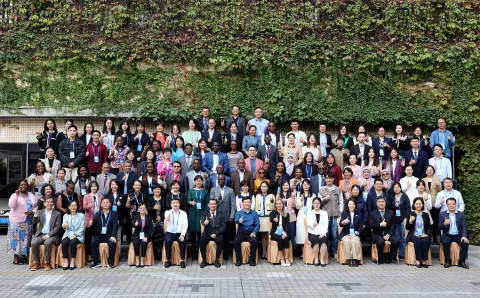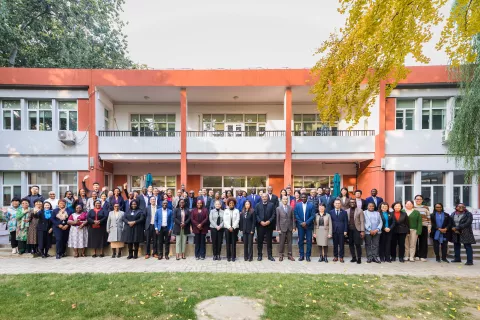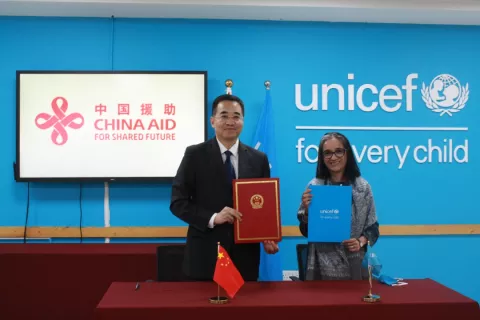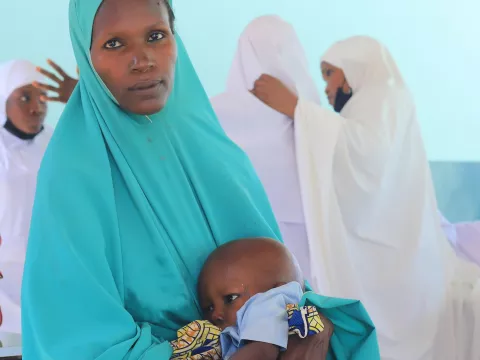USD One million contribution from the People’s Republic of China to improve neonatal health in Ethiopia
Ethiopia among eight African countries to receive funding from the China International Development Cooperation Agency to improve health services for mothers and newborn babies
- Available in:
- 中文
- English
Addis Ababa, 2 April 2020 – The People’s Republic of China, through its international aid agency the China International Development Cooperation Agency (CIDCA), has contributed USD One Million to improve the quality of health care provided to newborn babies in Ethiopia. The contribution is part of a larger, USD 8 million grant that CIDCA has made to eight African countries to improve their maternal and neonatal health services.
The grant to Ethiopia will improve the quality of health care for newborn babies through competency-based training and mentorship of health practitioners and tailored provision of equipment. UNICEF, which helped to negotiate the grant, will work with the Ministry of Health and its bureaus at the regional, district, and primary health care level to increase the availability of basic emergency obstetric and newborn care and newborn corners.
The grant will also help to improve quality of services provided through newborn intensive care units, integrated management of newborn and childhood illnesses, community-based newborn care, and clinical mentorship. The project will be implemented in four districts in the Tigray Region and five districts in the Southern Nations, Nationalities, and Peoples (SNNP) Region.
The districts in the SNNP Region were selected by the Ministry of Health because they are among the poorest and difficult-to-reach. The districts in the Tigray Region have some of the lowest maternal, child, and newborn health indicators in the region.
“Improving quality health care around the time of birth and providing special care for sick and small newborn babies is absolutely essential to saving babies,” said Minister of Health Dr. Lia Tadesse. “This requires well-trained, well-supported and well-equipped health workers, including midwives in delivery rooms and neonatal nurses in neonatal intensive care units. It also requires availability of appropriate treatments for neonatal sepsis, including essential commodities.”
“We are delighted with this grant as it will go a long way towards improving the quality of health care provided to some of the most remote and disadvantaged communities in Ethiopia,” said UNICEF Representative Adele Khodr. “For this, we express our heartfelt gratitude to the People’s Republic of China.”
The grant comes against a backdrop of progress in reducing child deaths in Ethiopia. In 1990, 222 children out of a thousand were dying before their fifth birthday. By 2019, the number had declined to 55 deaths. Despite this reduction however, deaths of newborn babies have remained stubbornly high, with 100,000 dying every year and accounting for 55 per cent of all under-5 child deaths.
An estimated half of stillbirths occur during labor and delivery and approximately a third of newborn deaths occur within 24 hours of birth. The main causes of death include pre-term births, which often leads to low birth weight; infection (sepsis), and birth asphyxia. More than 80 per cent of these deaths – 80,000 annually - could be prevented through cost-effective, proven interventions that already exist.
The project will cover 49 health centres, 219 health posts, and six primary hospitals in the two regions. An estimated 94,000 pregnant women and newborn babies will benefit from the project.
Media contacts
About UNICEF
UNICEF works in some of the world's toughest places, to reach the world's most disadvantaged children. Across 190 countries and territories, we work for every child, everywhere, to build a better world for everyone.
| Visit UNICEF Global website: www.unicef.org Visit UNICEF China website: www.unicef.cn Follow us on Sina Weibo: http://weibo.com/unicefchina Tencent Weibo: http://t.qq.com/unicef Wechat: unicefchina |





